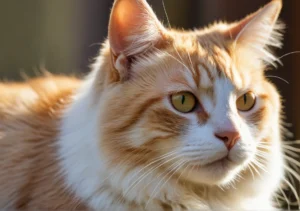Cats have a curious and often puzzling attraction to scratching sounds. What is it about these noises that captures their attention so completely? Let’s delve into the reasons behind why cats are drawn to scratching sounds.
Evolutionary Instincts
Have you ever wondered why your cat’s ears perk up at the sound of scratching? It all goes back to their evolutionary instincts. Cats are natural hunters, and in the wild, the sound of scratching often signals potential prey nearby. So when your furry friend hears that familiar sound, their instincts kick in, prompting them to investigate and potentially pounce on the source.
Additionally, scratching sounds may remind cats of grooming behaviors. In the wild, cats scratch to maintain their claws for hunting and self-defense. So, when they hear scratching sounds, it may trigger a response linked to these survival instincts. It’s like a call to action for your feline friend, activating their natural behaviors honed over generations.
Communication Signals
Scratching sounds are not just random noise to cats; they can also serve as communication signals. Cats are known for their subtle ways of communicating, and scratching sounds can convey a variety of messages. For instance, when a cat scratches near their food bowl, they may be signaling contentment or gratitude. On the other hand, scratching near a door could indicate a desire to go outside or explore a new area.
Moreover, cats use scratching sounds to mark their territory. The sound, combined with the physical act of scratching, leaves behind both auditory and olfactory markers that other cats can pick up on. It’s like leaving a calling card that says, “This is mine.” So next time you hear your cat scratching, remember they might be trying to tell you something through this subtle form of communication.
Bonus Insight : Some cats may also scratch in response to stress or anxiety. By creating noise through scratching, they may be trying to alleviate tension and comfort themselves in a challenging situation. If you notice excessive scratching or other signs of stress in your cat, consider providing them with extra care and attention to help them feel more secure.
Sensory Stimulation
When it comes to why cats are attracted to scratching sounds, it all boils down to sensory stimulation. Cats have incredibly sharp senses, and the sound of scratching provides them with a mix of auditory and tactile enrichment. The sharpening of claws produces a distinct sound that engages a cat’s keen sense of hearing, much like when you listen to your favorite music or a satisfying ASMR video. This unique sensation can be both engaging and comforting for your feline friend.
Additionally, scratching sounds can also help cats maintain their claws and mark their territory. The sound of scratching serves as a form of communication for cats, allowing them to leave behind both visual and auditory cues that say, “This is mine,” to other felines in the area. So next time you hear your cat scratching away, remember that it’s not just about sharpening claws—it’s also about creating a sense of home and security for your furry companion.
Benefits of scratching sounds for cats:
– Provides sensory stimulation
– Helps maintain claws
– Helps mark territory
– Creates a sense of security
Hunting Behavior
Ever wondered why cats go wild at the sound of scratching? It’s all about tapping into their primal hunting instincts. Just like their wild ancestors, domestic cats have a strong prey drive that kicks into gear when they hear the sound of scratching. This instinctual behavior is hardwired into their DNA, causing them to react as if they were chasing after prey in the great outdoors.
When your cat hears the sound of scratching, it triggers a rush of adrenaline and excitement, much like when you hear the ice cream truck coming down the street. This response is a throwback to their hunting days when they relied on their acute senses to track down their next meal. So, the next time your cat pounces at the sound of scratching, remember that it’s not just playtime—it’s a way for them to unleash their inner predator in a safe and controlled environment.
How scratching sounds trigger hunting behavior in cats:
– Activates prey drive
– Creates excitement and adrenaline
– Mimics hunting behavior
– Provides mental and physical stimulation
Territory Marking
Cats are naturally drawn to scratching sounds because it is a way for them to mark their territory. When they scratch, they are leaving both a visual and olfactory mark through the scent glands on their paws. This behavior allows them to establish boundaries and communicate with other cats in the area. So, if you hear your feline friend scratching away, it’s just their way of claiming their space and making sure everyone knows it’s theirs.
Stress Relief
Scratching is not only about marking territory but also serves as a stress-reliever for cats. When they scratch, they release built-up tension and anxiety, helping them feel more relaxed and at ease. The sound of scratching itself can be soothing for them, much like how we might find comfort in fidgeting or tapping our fingers when we’re stressed. So, if your cat seems to be fixated on scratching sounds, they might just be using it as a way to unwind and destress.
Additional Unique Insight:
Here are some ways to provide your cat with alternative outlets for scratching: – Invest in a scratching post or pad to redirect their scratching behavior. – Use pheromone sprays or diffusers to help reduce stress and anxiety in your cat. – Provide interactive toys to keep them mentally stimulated and prevent boredom. – Regular play sessions can also help burn off excess energy and reduce the urge to scratch excessively.
Social Interaction
When it comes to social interaction, scratching sounds play a vital role in cat communication. Cats use scratching as a way to mark their territory, leaving both visual and auditory cues for other cats. When a cat scratches, it not only leaves scent but also creates a distinctive sound that can be heard by other cats in the vicinity. This auditory marking helps cats establish boundaries and hierarchies within their social groups.
Additionally, scratching sounds can also serve as a form of bonding between cats and their owners. Many cats learn to associate the sound of scratching with positive experiences like playtime, treats, or affection from their human companions. This conditioning can lead to cats feeling more comfortable and secure in their environment when they hear scratching sounds.
To foster social interaction and strengthen the bond between you and your cat, consider incorporating scratching posts or pads into your home. These designated scratching areas can help redirect your cat’s natural scratching behavior in a positive way, reducing the likelihood of unwanted scratching on furniture or carpet.
Problematic Behaviors
Excessive scratching or negative associations with scratching sounds can lead to problematic behaviors in cats. If your cat is scratching excessively, it may be a sign of stress, anxiety, or the need for more mental and physical stimulation. In some cases, cats may develop negative associations with scratching sounds if they have been scolded or punished for scratching in the past.
To address these issues, it’s essential to provide your cat with appropriate outlets for scratching, such as scratching posts or pads. Encourage your cat to use these designated scratching areas by placing them in strategically important locations and rewarding your cat with treats or praise when they use them.
If your cat continues to exhibit problematic scratching behaviors, consider consulting with a veterinarian or animal behaviorist for additional guidance. They can help determine the root cause of the behavior and provide tailored solutions to manage and redirect it effectively.
Tips for Managing Problematic Scratching Behaviors:
- Provide Multiple Scratching Surfaces: Place scratching posts or pads in various locations throughout your home to give your cat options for scratching.
- Trim Your Cat’s Nails: Regularly trim your cat’s nails to reduce the damage caused by scratching.
- Use Positive Reinforcement: Reward your cat with treats or affection when they use designated scratching areas.
Fun Facts About Cats and Scratching
Did you know that cats are attracted to scratching sounds because it mimics the natural behavior of their wild ancestors? In the wild, cats scratch trees to mark their territory and keep their claws sharp. The sound of scratching triggers their hunting instinct and provides them with a sense of comfort and security.
Another interesting fact is that cats have scent glands in their paws, so when they scratch a surface, they leave behind pheromones that help them communicate with other cats. This is why your feline friend may scratch furniture or walls to leave their scent and establish their territory.
Cats also use scratching as a way to stretch their muscles and maintain their physical health. Scratching helps them remove the outer sheath of their claws, revealing new sharp claws underneath. So, the next time you hear your cat scratching, remember that it’s not just about sharpening claws but also about marking territory and staying healthy.
Conclusion
Understanding why cats are attracted to scratching sounds can help us better appreciate and respect their natural instincts. By providing your cat with appropriate scratching posts and surfaces, you can satisfy their need to scratch while protecting your furniture. Remember, scratching is an essential behavior for cats, so instead of discouraging it, try to redirect their scratching behavior to more suitable objects. By doing so, you can foster a healthy and happy relationship with your feline companion.
Alex, a passionate animal lover, has experience in training and understanding animal behavior. As a proud pet parent to two dogs and three cats, he founded AnimalReport.net to share insights from animal experts and expand his knowledge of the animal kingdom.




